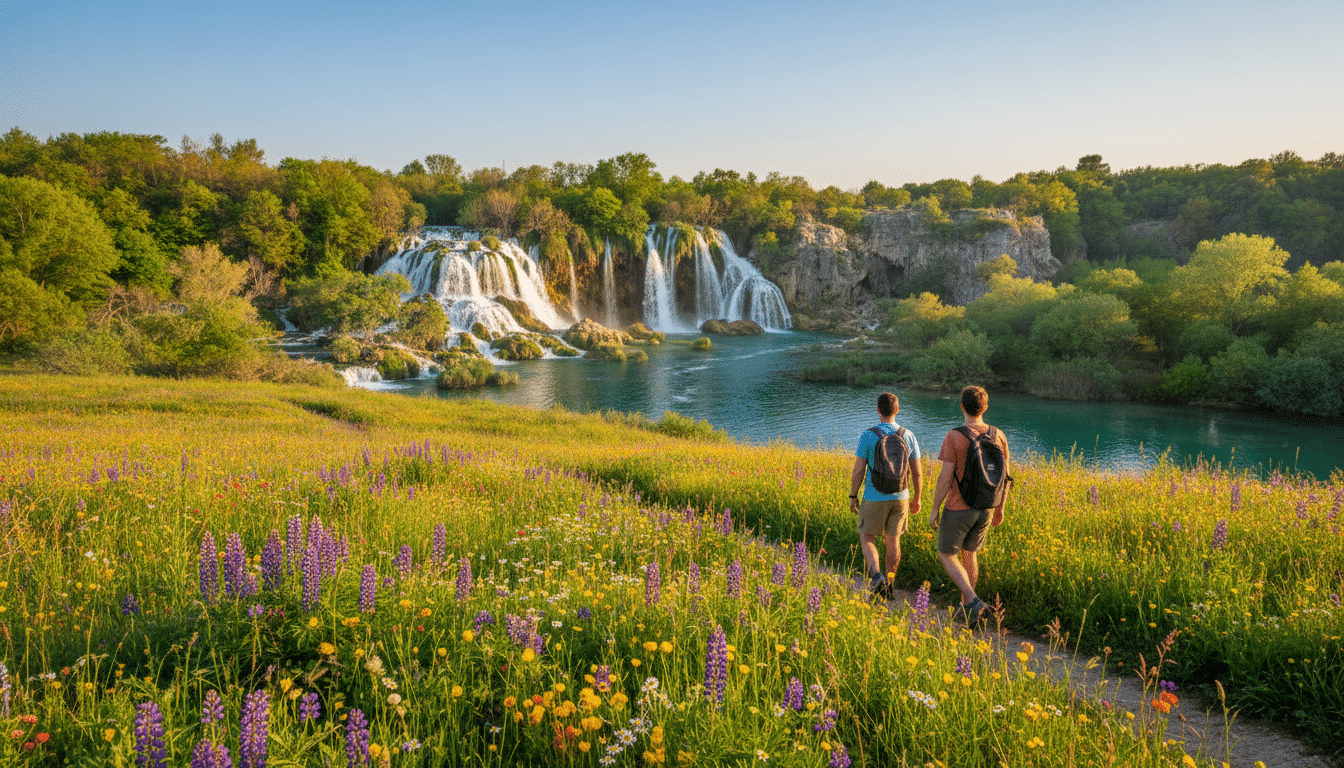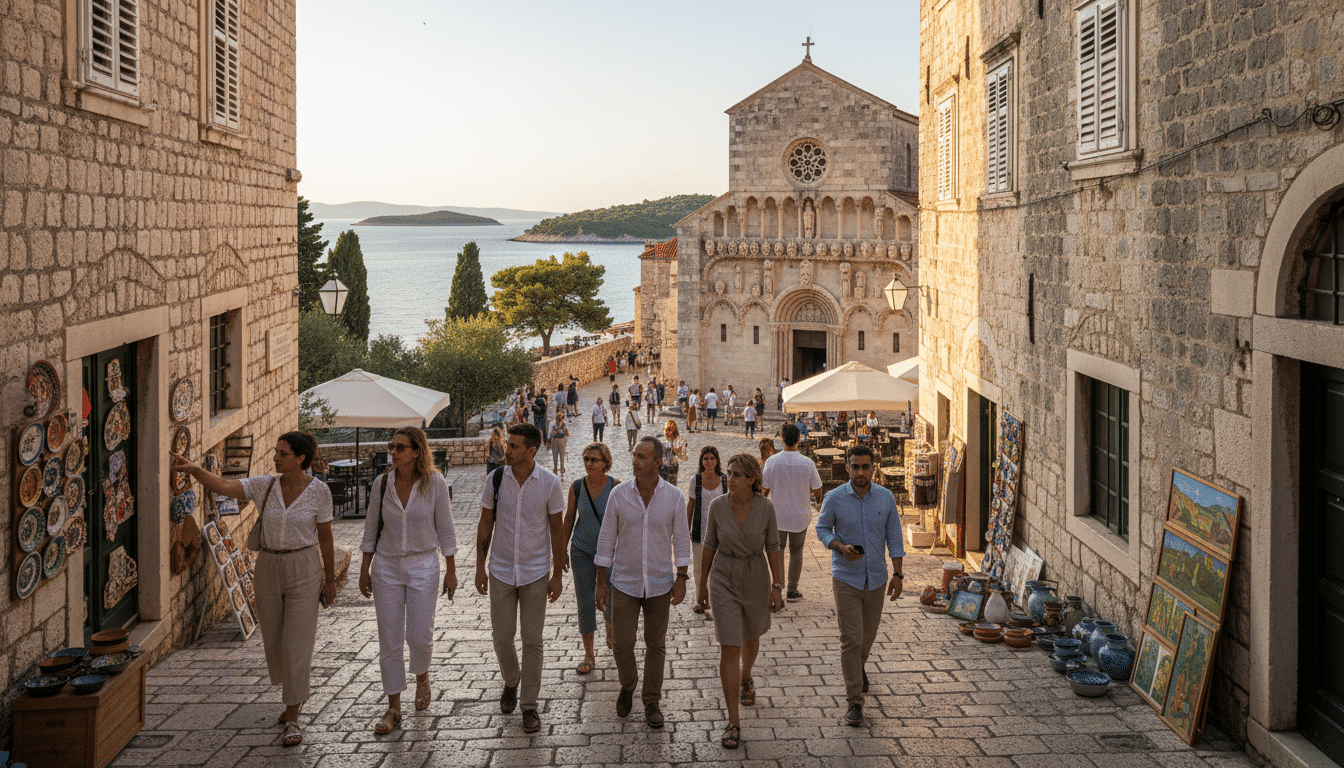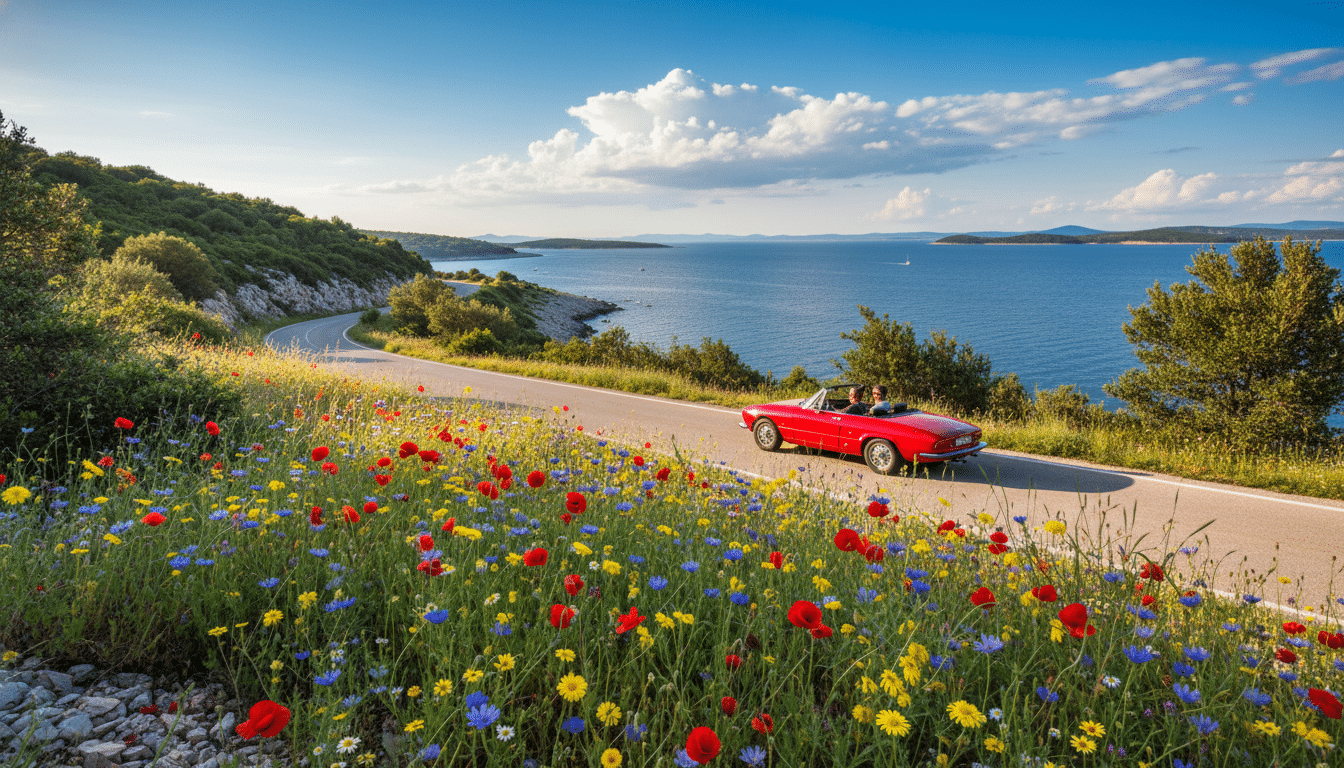Have you ever wondered how to pair a bustling coastal city with the charm of a tiny island town in one smooth, memorable outing?
I guide you step by step through this perfect day trip along the Dalmatian coast. Trogir sits on a small island between the coast and Čiovo, linked by bridges. Its UNESCO center is largely pedestrianized and filled with Venetian-era lanes and palaces.
From my experience, travel choices shape the feel of your visit. Take Bus 37 for an economical ride, a faster coach for speed, or drive and park outside the Old Town. In high season, boats add seaside flair but limit time ashore.
We’ll hit core sights—the Cathedral bell tower, Kamerlengo Fortress, Loggia, St. Mark’s Tower—and wander intimate lanes where the architecture tells stories. I point out the best waterfront views and cozy spots for coffee or dinner.
Key Takeaways
- Plan transport by budget and pace—options suit every traveler.
- Old Town size makes it easy to explore on foot.
- Venetian details define the town’s atmosphere and architecture.
- Best views appear naturally along the waterfront and towers.
- This post gives a clear flow so you enjoy every minute.
How this How-To guide helps you plan the perfect day on the Dalmatian Coast
I’ve condensed practical tips so you can follow a clear, flexible plan. This post shows transport choices—local Bus 37 versus coaches, driving with parking outside the Old Town, or scenic boat options. You’ll learn when each works best for time, comfort, and cost.
What to expect on the route: a concise flow that links your arrival to must-see spots. I point out the Cathedral of St. Lawrence plus bell tower, Loggia and Clock Tower, Kamerlengo Fortress events, St. Mark’s Tower, several monasteries, Cipiko Palace, and the waterfront promenade.
- I list the top things to prioritize so you save time and skip guesswork.
- I mark where queues form and where quiet corners sit near world heritage landmarks.
- Practical reminders cover tickets, cash, footwear, and quick alternatives if weather or crowds force a change.
Follow this guide and you’ll know when to climb, when to linger, when to move on. By the end you’ll feel ready to enjoy the town-to-town route without rush.
How to get from Split to Trogir: routes, times, and costs
Getting between these two coastal spots is easier than it looks—here’s how to pick the right route for your pace and budget.
By bus
Bus 37 is the cheapest choice at about €2. Expect many stops; the ride can take roughly 60 minutes and feel bumpy at times. Faster coaches cut travel time to about 20 minutes. They cost near €3, run less often, and are listed on buscroatia.com.
By car
Driving takes about 30 minutes. You’ll find parking lots outside the Old Town, then cross the bridge on foot to reach the gates. This option gives flexibility but watch for rush-hour traffic on the dalmatian coast.
By boat & organized options
In high season, water taxis and speedboats offer scenic views. Boats shine when weather is good and luggage is light. Many organized tours combine visits to the Blue Lagoon or nearby islands, though time in town can be as little as 1 hour.
- Quick comparison: Bus 37 = cheap, ~60 minutes; coaches = faster, ~20 minutes.
- Car: ~30 minutes with parking outside the historic core and a short walk over the bridge.
- Boat: Best for views; less control over schedule during peak season.
Split and Trogir a day trip itinerary: make the most of one day
Start your itinerary at the lively market on the mainland. Coaches and local services drop near the stalls. Buy water, fruit, or savory snacks before you cross the bridge into the pedestrian Old Town.
Wander marble streets and stone courtyards toward the main square. The lanes open to Venetian palaces and small plazas perfect for photos and people-watching.
Morning highlights
At the Cathedral of St. Lawrence, study Radovan’s Portal closely. If you have time, climb the bell tower for sweeping views—the stairs are steep and narrow, so go early to avoid heat and queues.
Midday pace
Pause on the waterfront promenade for coffee with marina views. Then loop to Kamerlengo Fortress and St. Mark’s Tower to feel the town’s past against the Adriatic.
Optional detour
If the afternoon gets warm, cross to Čiovo for beaches such as Okrug Gornji or to visit quiet monasteries like St. Dominic. Return in time for golden-hour photos and an early dinner near the main square.
- Market start: snacks and supplies before the bridge.
- Cathedral: note Radovan’s Portal, time your bell climb.
- Promenade: coffee, marina views, easy rhythm.
- Fortress & tower: history framed by sea views.
Top sights that define Trogir’s UNESCO World Heritage Old Town
Trogir’s Old Town packs centuries of history into a compact, walkable grid. I lead you through the must-see landmarks so every stop feels clear and memorable.
Cathedral of St. Lawrence and its terracotta-tipped bell tower
The cathedral dates from the 12th century with Romanesque bones and later Gothic flourishes. Climb the bell tower for panoramic views—it gives the best sense of the town’s layered architecture by century.
Loggia & Clock Tower on the main square
The Loggia served civic life for centuries. The Clock Tower nearby bears 15th-century carved reliefs; pause to read the stone benches and carved ceilings that tell local history.
Monastery by the waterfront: serene cloisters and shaded gardens
Near the waterfront, the monastery cloisters offer shade from busy streets. Its gardens make a calm stop before you continue toward the fortress.
Kamerlengo Castle: Venetian fortress and summer events
Kamerlengo is a 15th-century fortress built by Venice. When open, I guide you up the ramparts for clear views of the harbor and the old defensive line.
St. Mark’s Tower and the vanished city walls
St. Mark’s Tower once linked the walls that now mostly vanish. Stand where walls met sea to picture how the town guarded its bridge and approaches from the mainland.
Cipiko Palace and Venetian Gothic details
Opposite the cathedral, Cipiko Palace shows ornate Venetian Gothic windows by Andrija Aleši. Look for Little Venice echoes—winged-lion marks and carved stone that tie the city to Venetian rule.
- Pro tip: For a short guided list of nearby tours and practical options, see this best tours guide.
- Where to stand: choose waterfront angles for the best views back across the harbor.
- Quick context: notice the Greek Kairos relief preserved at St. Nicholas Monastery for an unexpected ancient detail.
Practical tips for a smooth day: timing, tickets, and pedestrian streets
A few smart choices will keep your visit cool, safe, and stress-free. Spring and early fall offer pleasant weather with fewer crowds. Plan for half to full day here; that range covers main sights without rush.
Best time to go and how long you need
Arrive in the morning or late afternoon for softer light and lower heat. Midday fills with tours; choose quieter windows to linger at the cathedral or waterfront.
Footwear, sun, and bell tower safety considerations
Wear grippy shoes—the old streets can be smooth. Carry water, hat, sunscreen. The bell tower climb is steep with open sections and limited handrails; climb only if you are comfortable with heights and wind.
Money, parking, and car-free Old Town navigation
The core is pedestrian-only. Park in an official lot outside the historic area, then walk in. Bring some cash for small entries and coffee; cards work in larger places but may fail at tiny cafés.
- Quick checklist: morning arrival, grippy shoes, water, small cash, park in lot.
- Mobility note: choose gentler routes near the waterfront for easy rests.
- Backup travel: buses and boats connect to Split and the airport within minutes; keep schedule options handy.
Food and atmosphere: what to eat, where to sip, and where to stroll
Let your senses lead: seafood grills, coffee aromas, and waterfront lights set the tone for the evening. I point you to konobas that do grilled fish, black risotto, octopus, and peka so you taste Dalmatia without second-guessing.
Dalmatian classics
Try Konoba Tragos or Konoba Trs for seafood plates. Restoran il Ponte near the North Gate offers fresh catches and simple service. Black risotto and peka are must-orders for true local flavor.
Coffee culture
Slip off the main square to Café Smokvica for shaded seating and slow conversations. The quieter cafes near the cathedral give pause from busy streets and let you watch local life pass by.
Evening on the Riva
Finish with a gentle stroll along the waterfront to catch golden-hour views. Live music and lights on the water create an easy-going atmosphere that suits couples, families, and solo explorers.
- Where to sit: vine-draped terraces for atmosphere.
- Family tip: choose relaxed streets with benches for breaks.
- Gelato spot: grab a cone and wander toward the marina for final views.
Extend your perfect day trip: islands, Blue Lagoon, and coastal views
Add a coastal cruise to see hidden coves, snorkeling spots, and quieter islands nearby. Boats from the harbour link to Šolta and Drvenik, with many itineraries pausing at the Blue Lagoon for swimming and snorkeling.
Boat tours to Šolta, Drvenik, and the Blue Lagoon
If you have time to spare or stay overnight, choose a full-day boat option to avoid crowds on the islands. Shorter circuits give one swim stop; longer runs include multiple bays and small harbors.
Line up departure times so your harbor return fits the evening promenade. Water taxis run seasonally between the mainland and town, offering scenic coastal views and flexible returns.
- When to add a boat: if your schedule allows an extra half to full day, go for it.
- Packing: reef-safe sunscreen, light layers, comfortable shoes, and a dry bag for phones and tickets.
- Food timing: eat beforehand near the Old Town or plan a seaside konoba after your cruise for fresh fish and sunset views.
- Timing notes: check sea forecasts—winds change plans quickly; have a backup inner-harbor option.
Pairing boats with the UNESCO world heritage core gives you two views of the coast—historic stone lanes plus open sea scenery. I find this mix makes travel feel complete and calm when you balance time on land with time on water.
Conclusion
Finish your visit by letting the town’s layers of architecture settle into memory. The old town’s compact size makes it simple to cover key sights in half to one day from Split or Trogir by bus, coach, car, or boat.
You now have routes, timing, and the most rewarding things to see. Climb the bell tower for the skyline, wander stone lanes, then pause on the waterfront to feel the coast air.
For a perfect day trip, mix big hitters with quiet corners. The unesco world listing and world heritage site status frame every street with richness and care.
Use this guide to shape your perfect day. Come back for an evening, an island add-on, or a deeper look at Venetian-era architecture and local history.



